Crisis Services
24 Hour Crisis Line:
The 24 Hour Crisis Line provides telephone support for individuals in the Interlake-Eastern Regional Health Authority who are experiencing a mental health or psychosocial crisis. Also provides information and helpful resources to individuals looking for themselves or someone else.
Toll Free: 1-866-427-8628 or 204-482-5419
Crisis Stabilization Unit (CSU):
The Crisis Stabilization Unit is a nurse-managed, voluntary admission unit for individuals 15 years and older experiencing a mental health or psychosocial crisis. Located in Selkirk, the Crisis Stabilization Unit provides assessment, short term crisis intervention, treatment, and linkage/referrals to resources.
For referral information, please call: Toll Free: 1-888-482-5361 or 204-482-5361
Mobile Crisis Services- Adult & Youth Outreach Team:
Mobile Crisis Services provides voluntary services that are available to residents of all ages that reside in the Interlake-Eastern Regional Health Authority area. They are a multidisciplinary team that responds to individuals that are experiencing a mental health or psychosocial crisis. They provide phone support and active outreach. Mobile Crisis Services can provide mental health assessments, crisis intervention, linkage to resources and short-term follow-up.
Toll Free: 1-877-499-8770 or 204-482-5376
Hours of Operation
| Service | Days Open |
| Mobile Team Intake | 7 days a week |
| Mobile Adult Team | 7 days a week |
| Mobile Youth Team | Monday to Friday |
988: Suicide Crisis Helpline:
Call or text 988 to connect with a trained responder who will “listen without judgement, provide support and understanding, and can tell you about resources that will help”. Explore 988.ca to learn more about suicide and the 988: Suicide Crisis Helpline.
Websites
Antidepressant Skills Workbook: Simon Fraser University
Alcoholics Anonymous Manitoba (AA)
Anxiety Disorders Association of Manitoba (ADAM)
Cannabis & Psychosis: The Facts
Canadian Centre on Substance Use and Addiction
Canadian Mental Health Association
Children of Parents with a Mental Illness
Family Guide to Mental Health Recovery
Informed Choices About Depression
Manitoba Blue Cross Wellness Platform
Manitoba Farm, Rural & Northern Support Services
Mental Health Commission of Canada (MHCC)
Mental Health Education Resource Centre of Manitoba
Mood Disorders Association of Manitoba
National Eating Disorder Information Centre
Postpartum Depression Association of Manitoba
Frequently Asked Questions
When would someone call the 24 Hour Crisis Line?
The 24 hour crisis line is available to all individuals who are residents in the Interlake-Eastern Regional Health Authority. Individuals call for a variety of reasons; they are in a crisis, they are concerned about a loved one, they require information on where/how to access mental health supports/services or they just need someone to talk to. When someone calls the crisis line and requires further support beyond a phone call, a community visit by the Mobile Crisis Services can be arranged. We can follow-up with resources with your permission or provide follow-up phone calls to you to ensure the crisis is resolved or determine if further intervention is required.
What can I expect when I call Mobile Crisis Services?
The Intake Worker will welcome you to the service and determine why you have accessed Mobile Crisis Services. They will have several questions on the nature of the crisis, who your supports are, and questions regarding your safety. If you are calling because you are concerned about another individual, they will want to know if the person knows you are calling and would be willing to have Mobile Crisis Services involvement. They will also want to speak directly with the individual if at all possible. Mobile Crisis Services provides voluntary services, so if the individual is not willing to access services they will assist you in problem solving on how best to get help for the person. If you call and it is determined that the nature of the call is an emergency and requires immediate intervention, they will request that you call 911 or will access 911 on your behalf if required. If Mobile Crisis Services is going to come out to see you and provide crisis intervention, they will triage your case and provide phone support until the Mobile Crisis Team is able to see you.
What can I expect after I call Mobile Crisis Services?
Mobile Crisis Services provides in-home or community (local hospital, school, or RCMP detachment) intervention, support, and short-term crisis management to youth and adults in need. You can expect a team of 2 mental health professionals to attend to your home or community destination to assess your mental health issues like anxiety or depression or other stresses (E.g. relationship, work, school, finances, grief/loss, family, substance abuse, other). We will provide support, referrals, and follow up to help you recover from your crisis. Our ultimate goal is to help you maintain your safety and diffuse your crisis.
What do I do if I need to call outside of Mobile Crisis Services’ hours?
If you or a loved one is having a crisis and the Mobile Crisis Services is not open yet, please call the 24 hour Crisis Line at Toll Free: 1 (866) 427-8628 or (204) 482-5419.
Is anyone having a crisis welcome to stay at the Crisis Stabilization Unit or must I be from the town it is located in?
The Crisis Stabilization Unit is available to all individuals 15 years of age and older residing within Interlake-Eastern Regional Health Authority
Can I go to school and stay at the Crisis Stabilization Unit?
Staff will encourage you to consider taking a leave from school or work during your stay with us. If you are not able to take a leave of absence from school or work, a virtual admission may be offered. A virtual admission can be done over the phone or through Microsoft Teams and can be completed from home. Oftentimes your place of employment or school environment is a major stressor in one’s life. While everyone’s needs are different, most people do remain on the unit for the duration of their admission in order to promote individual recovery and to support the safety and well-being of all those on the unit. Passes related to managing your health and well-being (e.g. medical appointments) are supported.
Can I bring my children to the Crisis Stabilization Unit?
The Crisis Stabilization Unit provides services on an individual basis only, it does not have the capacity to allow individuals to bring other family members with them for their stay. Children and family members are welcome to come visit the Crisis Stabilization Unit during our visiting hours (afternoon & evening). The Crisis Stabilization Unit staff would be happy to problem solve other ways to arrange childcare so you can come to the Crisis Stabilization Unit.
Can I bring my phone while staying at the Crisis Stabilization Unit?
Yes! You are welcome to bring and use your personal phone to keep in touch with family and friends, schedule appointments, listen to music, or use apps, etc. We do have some house rules about use of electronics. These will be reviewed with you at the time of admission. The Crisis Stabilization Unit also offers free WIFI as well as computer access for use during your stay.
Will I be seeing a doctor or psychiatrist during my stay at the Crisis Stabilization Unit?
The Crisis Stabilization Unit is a nurse-managed facility though consultation with a psychiatrist may occur with some individuals. Generally, if health issues require attention during your stay at the Crisis Stabilization Unit, you may be encouraged to see your regular primary health care provider or nursing staff may contact your provider by telephone at your request. Locally in Selkirk there is also a walk-in clinic and Quick Care Clinic for non-urgent medical needs. You may also choose to discuss a referral to a psychiatrist through your community mental health worker or your primary health care provider.
Will I have a private room during my stay at the Crisis Stabilization Unit?
Currently the Crisis Stabilization Unit only has 1 private room on the main floor that is used mainly for individuals with mobility issues. The other rooms may be shared with 1-2 individuals of the same gender. The Crisis Stabilization Unit will work with individuals to ensure everyone feels comfortable and safe during their stay.
Crisis Stabilization Unit
A look inside: Crisis Stabilization Unit
The Living Room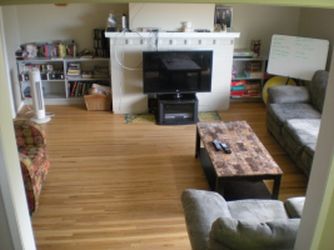 Common area for individuals to play games or watch movies. Each day of the week there is a therapeutic group held for all individuals from 10:30AM-11:30AM. During these sessions you will learn a variety of things such as positive coping strategies and useful life skills. | The Dining Room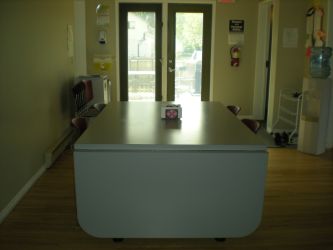 All meals are eaten together at the dining room table. Breakfast is provided continental style, lunch and supper meals are also provided. The Crisis Stabilization Unit will attempt to accommodate dietary needs where possible. |
The Wellness Room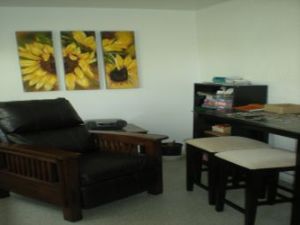 This is a quiet place to journal, read, relax, do a puzzle or work on your wellness plan. Developing a wellness plan will support you in creating strategies aimed at helping you move towards crisis stabilization. This is also where you will meet with a nurse daily for a check-in. | The Bedroom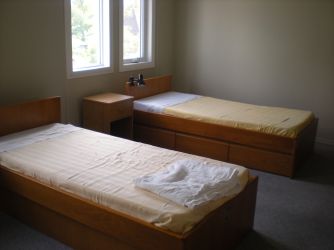 The Crisis Stabilization Unit is an 8 bed facility that provides a safe environment. Staff are available to support individuals 24 hours a day. The Crisis Stabilization Unit welcomes all individuals 15 years of age and older. |
The Backyard During the summer months the backyard and gazebo are a great place to relax and enjoy the outdoors. | The Patio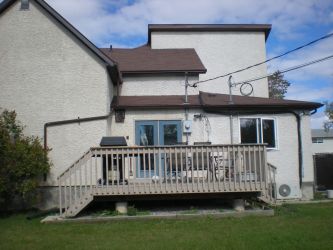 The outdoor common area is a great place to read, journal or enjoy a morning coffee. |






